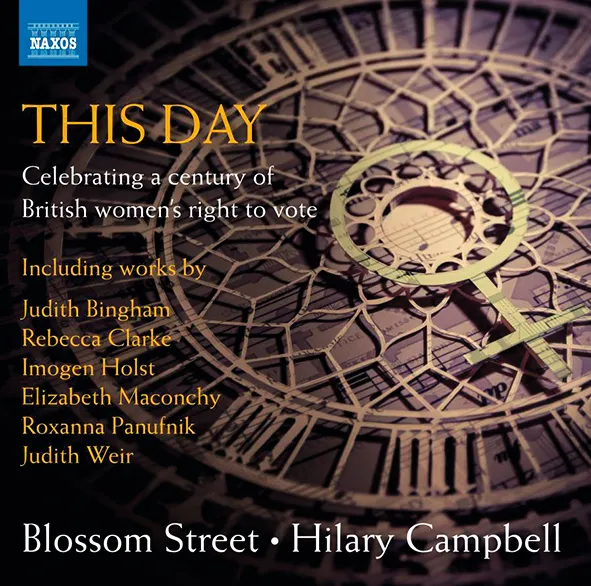
This Day – Celebrating a century of British women’s right to vote Works by Judith Bingham, Rebecca Clarke, Imogen Holst, Elizabeth Maconchy, Roxanna Panufnik and Judith Weir Vanessa Bowers, Melissa Davies, Ellie Martin, Emily Wenman (soprano), Philipa Thomas (mezzo-soprano), Hannah Lawrence (clarinet), Annabel Thwaite (piano), Anna Lapwood (organ); Blossom Street/Hilary Campbell Naxos 8.573991 56:09 mins
This selection of short choral pieces by a near-century of British composers who are female, performed entirely by women, is a veritable chocolate box album. The pieces are excellently chosen and programmed, representing a wide variety of styles. Some real gems are among them, with topics ranging from love sacred, motherly or lost, to the glories of nature and even a ghost story. The title comes from the work by Elizabeth Maconchy – which would be one of the best, were most of the others not equally inspiring. There is streamlined writing in Rebecca Clarke’s Ave Maria, mysterious harmonic worlds from Judith Weir and Nicola LeFanu, a quirky and touching take on American lullabies from Kerry Andrew, a riot of bird noises in Roxanna Panufnik’s ‘The Sweet Spring’, heartbreak in Alison Willis’s ‘Do Not Stand at my Grave and Weep’ and drama, plus a poem by Lady Elgar, in Judith Bingham’s ‘The Ghost of Combermere Abbey’ – and much more, with everything meriting a revisit.
Blossom Street under Campbell’s direction gives committed performances, strong, flexible and sure-toned. Varied sounds – which are admittedly valuable with a resonantly recorded, women-only choir – include some good organ playing and, in Stef Conner’s gorgeous ‘O splendissima gemma’, a solo clarinet threading its way through the tendrils of the texture (I searched in vain for a credit to the instrumentalists – and the words for two tracks have been wholly omitted from the booklet). With luck, this collection will be an effective springboard for listeners to carry on exploring the music of these splendid composers.
Jessica Duchen